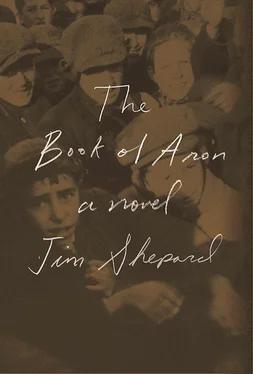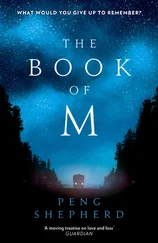Jim Shepard
The Book of Aron
MY MOTHER AND FATHER NAMED ME ARON, BUT my father said they should have named me What Have You Done, and my uncle told everyone they should have called me What Were You Thinking. I broke medicine bottles by crashing them together and let the neighbors’ animals loose from pens. My mother said my father shouldn’t beat such a small boy, but my father said that one misfortune was never enough for me, and my uncle told her that my kind of craziness was like stealing from the rest of the family.
When I complained about it my mother reminded me I had only myself to blame, and that in our family the cure for a toothache was to slap the other side of your face. My older brother was always saying we all went without cradles for our backsides or pillows for our heads. Why didn’t he complain some more, my mother suggested. Maybe she could light the stove with his complaints.
My uncle was my mother’s brother and he was the one who started calling me Sh’maya because I did so many things that made him put his finger to his nose as a warning and say, “God has heard.” We shared a house with another family in Panevzys near the Lithuanian border. We lived in the front room with a four-paned window and a big stove with a tin sheet on top. Our father was always off looking for money. For a while he sold animal hides. Our mother wished he would do something else, but he always said the pope and the peasant each had their own work. She washed other people’s floors and when she left for the day our neighbors did whatever they wanted to us. They stole our food and threw our things into the street. Then she came home exhausted and had to fight with them about how they’d treated us, while I hid behind the rubbish pile in the courtyard. When my older brothers got home they’d be part of the shouting, too. Where’s Sh’maya? they’d ask when it was over. I’d still be behind the rubbish pile. When the wind was strong, grit got in my eyes.
Sh’maya only looks out for himself, my uncle always said, but I never wanted to be like that. I lectured myself on walks. I made lists of ways I could improve. Years went by like one unhappy day.
My mother tried to teach me the alphabet, unsuccessfully. She used a big paper chart attached to a board and pointed to a bird or a little man or a purse and then to the letter that went with them. A whole day was spent trying to get me to draw the semicircle and straight line of the letter alef. But I was like something that had been raised in the wild. I didn’t know the names of objects. Teachers talked to me and I stared back. Alef, beys, giml, daled, hey, vov, zayin. My last kheyder results before we moved reported my conduct was unsatisfactory, my religion unsatisfactory, my arithmetic unsatisfactory, and even my wood- and metal-shop work unsatisfactory. My father called it the most miserable report he’d ever seen, and invited us all to figure out how I had pulled it off. My mother said that I might’ve been getting better in some areas and he told her that if God gave me a second or a third life I’d still understand nothing. He said a person with strong character could correct his path and start again but a coward or weakling could not. I always wondered if others had such difficulty in learning. I always worried what would become of me if I couldn’t do anything at all. It was terrible to have to be the person I was.
I spent rainy days building dams in the street to divert the runoff. I found boards and pushed them along puddles with sticks. My mother dragged me out of the storms, saying when she found me that there I sat with my dreams full of fish and pancakes. She said while she bundled me into bed next to the stove that I’d never avoided an illness, from chicken pox to measles and scarlet fever to whooping cough, and that was why I’d spent my whole life ninety-nine percent dead.
At night I lay waiting for sleep like our neighbor’s dog waited for passing wagons. When she heard me still awake my mother would come to my bedside even as tired as she was. To help me sleep she said that if I squeezed my eyelids tight, lights and planets would float down past them, though I’d never be able to count them before they disappeared. She said that her grandfather told her that God moved those lights and planets with his little finger. I told her I was sorry for the way I was and she said that she wasn’t worried about school, only about how I was with my family and our neighbors. She said that too often my tongue worked but not my head, or my head worked but not my heart.
YET WHEN MY YOUNGER BROTHER WAS BORN, I TOLD her I wanted him thrown into the chicken coop. I was glum that whole year, when I was four, because of an infected vaccination on my arm. My mother said I played alone even when other kids were about. Two years went by without my learning a thing. I didn’t know how to swim or ride a bicycle. I had no grandparents, no aunts, and no godparents. When I asked why, my father said it was because society’s parasites ate well while the worthy received only dirty water, and my mother said it was because of sickness. I attended kheyder until my father came back from one of his trips and told my mother that it was 1936 and time for me to get a modern education. I was happy to change, since our kheyder teacher always had food in his beard and caned us across the fingers for wrong answers and his house smelled like a kennel. So instead I went to public school, which was cleaner all around. My father was impressed that my new teacher dressed in the European style and that after he taught me to read I started teaching myself. Since I was bored and knew no one I took to books.
And in public school I met my first friend, whose name was Yudl. I liked him. Like me, he had no future. He was always running somewhere with his nose dripping. We made rafts to put in the river and practiced long-distance spitting. He called me Sh’maya too and I called him Pisher. When he wasn’t well-behaved he was clever enough to keep the teacher from catching on. One morning before anyone arrived we played tipcat so violently we broke some classroom windows. We scared the boys who had nice satchels and never went barefoot. He was always getting me into trouble at home, and one Sabbath I was beaten for taking apart the family scissors so I could have two little swords, for him and for me. His mother taught him only sad songs, including one about the king of Siberia, before she got sick because of her teeth and died. He came looking for me once she was dead but I hid from him. He told me the next day that two old men carried her out of the house on a board and then his father moved him away.
THAT SUMMER A CARD ARRIVED FOR MY FATHER from his cousin in Warsaw, telling him there was work in his factory. The factory made fabric out of cotton thread. My father hitched a ride to the city in a truck full of geese and then sent for us. He moved us to 21 Zamenhofa Street, Apartment no. 6—my mother had us each memorize the address so we could find it when we got lost — and my younger brother, who had a bad lung, spent his days at the back window looking out at the garbage bins. We both thought the best thing about the move was the tailor’s shop across the square. The tailor made uniforms for the army and in the front of his window there were three rows of hand-sized mannequins, each dressed in miniature uniforms. We especially loved the tiny service ribbons and medals.
Because it was summer I was expected to work at the factory, so far away that we had to ride the trolley. I was shut up in a little room with no windows and four older boys and set to finishing the fabrics. The bolts had to be scraped until they acquired a grain like you found on winter stockings. Each of them took hours and someone as small as me had to lean his chest onto the blade to scrape with enough force. On hot days sweat ran off me like rain off a roof. The other boys said things like, “What a fine young man from the country we now have in our midst; he’s clearly going to be a big wheel in town,” and I thought, am I only here so they can make fun of me? And I refused to go back.
Читать дальше












